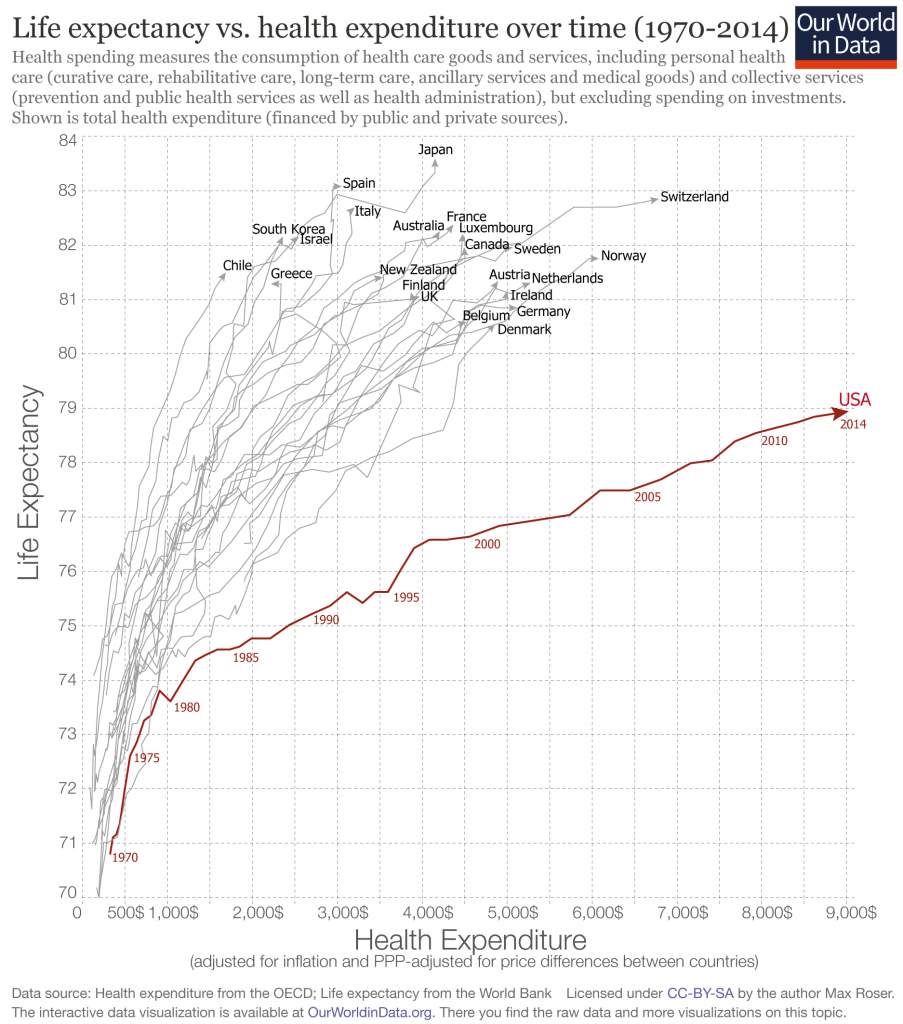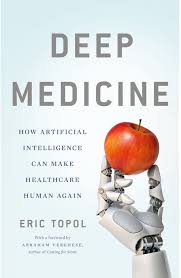 “Bold thinking is great. Bold doing is better,” Dr. Eric Topol introduced his talk yesterday at Medecision’s Liberation 2019 conference.
“Bold thinking is great. Bold doing is better,” Dr. Eric Topol introduced his talk yesterday at Medecision’s Liberation 2019 conference.
I have the opportunity, for which I’m so grateful, of not only attending this meeting but playing a role as a speaker, a sometimes stage “emcee,” and a keynote speaker. And as an attendee, I learn so much from other speakers, fellow attendees, and Medecision staff all sharing perspectives during breakouts and networking breaks.
In mode of attendee (and self-confessed collegial-groupie of Dr. Topol’s), I took in his remarks taking notes as fast as I could thanks to Mom teaching me how to type on an IBM Selectric (the significance of which I wrote about here in the Huffington Post).
Riffing on his great book, Deep Medicine: How AI Can Humanize Health Care, Eric started his talk donning my own professional hat as a heath economist, sharing data about America’s high health care spending with low ROI yield. “The U.S. is a distinct negative outlier,” the doctor noted, pointing to the detailed data from the OECD published in The Economist.
 More people going into health care jobs, he continued, with the latest data from the Bureau of Labor Statistics illustrating that we’re adding more human capital to a broken health care system. “This isn’t the answer to our problem,” Eric asserted.
More people going into health care jobs, he continued, with the latest data from the Bureau of Labor Statistics illustrating that we’re adding more human capital to a broken health care system. “This isn’t the answer to our problem,” Eric asserted.
He showed new evidence from Nature (journal) Volume 574 dated 24th October 2019 — Eric is never guilty of showing old data unless it’s making a new-new insight. The article in Nature was “Quantum Supremacy Using a Programmable Superconducting Processor,” demonstrating that instead of 10,000 years to analyze data, the new analytics capability enables a calculation in a matter of seconds.
Then Eric quoted Thomas Friedman’s January 2019 op-ed from the New York Times, titled, “Warning: everything is going deep.” Friedman, author of one of my go-to tomes, The World is Flat, called out that in 2019, “The word for the year is ‘deep,'” as in “deep learning, deep insights, deep artificial minds.”
For Dr. T, it’s all about “Deep Medicine.”
What can going deep in medicine do for health systems, health care, doctors and patients?
 Eric offered several prescriptions, #1 being to use evidence to underpin workflows, diagnoses and prescribed therapies and procedures.
Eric offered several prescriptions, #1 being to use evidence to underpin workflows, diagnoses and prescribed therapies and procedures.
Here, he described the evidence demonstrating that statins work in only 18 of 1,000 patients, but of course statins are prescribed the world over in millions of patients, making the drug category one of the top prescription medicines on the Planet. This is the illusion of treatment that doesn’t do anything.” Instead, we need to do polygenic risk scores instead of taking statins, Eric argued based on the evidence for doing so published in JAMA and New England Journal of Medicine. “Polygenic risk scores are going to be the future.”
So why aren’t these risk scores used by cardiologists, internists and PCPs today?
Because of “sclerosis of the medical community,” Eric called it.
 He continued his prescriptions for making health care more human, humane, and evidence-based with other bold ideas including getting rid of keyboards in the physician-patient encounter, ensuring patients own/control their personal health data, and increasing the time shared between doctors and patients during the encounter.
He continued his prescriptions for making health care more human, humane, and evidence-based with other bold ideas including getting rid of keyboards in the physician-patient encounter, ensuring patients own/control their personal health data, and increasing the time shared between doctors and patients during the encounter.
Finally — my most re-tweeted tweet during the session — Dr. T asserted that, “There is no room for hospitals in the future. It’s all about the patient’s bedroom.” Eric’s point wasn’t that we don’t need emergency and trauma services, ICUs and other brick-and-mortar health care sites for people who need care in complex settings. But for so many conditions that can be managed remotely and via self-care technologies enabled by broadband connectivity…we’re getting there.
I quite concur: this is the last section of my book, HealthConsuming: From Health Consumers to Health Citizens. That paragraph imagines how our homes can and should be our health hubs, enabled by connectivity (ensuring net neutrality and fast lines for all), privacy and data security, and universal health care access.
That, too, was a prime Dr. Topol moment, wearing his health policy hat: his belief that the U.S. as a “negative outlier” in the developed world is that way because the nation does not guarantee universal health care as a civil and human right.
It’s not only AI that can help humanize health care. It’s people like Dr. Eric Topol living out bold thinking and bold doing.




 I am so grateful to Tom Lawry for asking me to pen the foreword for his book, Health Care Nation,
I am so grateful to Tom Lawry for asking me to pen the foreword for his book, Health Care Nation,  I love sharing perspectives on what's shaping the future of health care, and appreciate the opportunity to be collaborating once again with Duke Corporate Education and a global client on 6th May. We'll be addressing some key pillars to consider in scenario planning such as growing consumerism in health care, technology (from AI to telehealth), climate change, and trust -- the key enabler for health engagement or dis-engagement and mis-information. I'm grateful to be affiliated with the corporate education provider
I love sharing perspectives on what's shaping the future of health care, and appreciate the opportunity to be collaborating once again with Duke Corporate Education and a global client on 6th May. We'll be addressing some key pillars to consider in scenario planning such as growing consumerism in health care, technology (from AI to telehealth), climate change, and trust -- the key enabler for health engagement or dis-engagement and mis-information. I'm grateful to be affiliated with the corporate education provider  Thank you FeedSpot for
Thank you FeedSpot for